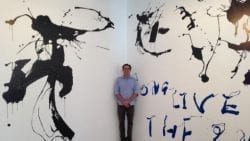The small bar expansion in Sydney, and its outer suburbs continues to attract new licensees, with no signs of it abating but NSW government legislation is hurting the industry.
Lockout laws and a change in the legislation restricting patronage means profitability is becoming limited.
This Must be the Place small bar owner Luke Ashton is persevering despite a drop in patrons.
“At peak times on a Friday and Saturday night when you are restricted to having only 60 guests in your venue, there is only so much revenue that can be made selling drinks and food, especially when you are adhering to the your Responsible Service of Alcohol obligations,” Luke Ashton, co-founder of This Must be the Place and 2013 Diageo World Class Bartender of the Year, says.
“There are some operators that are doing well and others who aren’t, but all of them would agree there has been a dramatic drop in number of people since the lockouts were introduced.”
Martin O’Sullivan runs the bar Grasshopper in Sydney’s CBD.
The NSW government introduced the small bar liquor licence in 2013 to encourage more diverse night-time entertainment options. This was a new liquor licence. As part of the statutory law, the laws have to be reviewed every three years. This is standard with all new liquor licences.
There are currently 50 small bars across NSW operating under the licence.
Even though the NSW government is reviewing the small bar liquor licence, which restricts the patronage to 60 people (see The rules breakout, below), there seems no shortage of eager bar entrepreneurs wanting to take a new licence.
“There’s definitely money to be made for those that are good at what they do, are willing to put the hard work in and are passionate,” Tim Philips, co-owner of Bulletin Place and Dead Ringer bars, says.
“The issue with small bars is that they are small. Meaning as an owner you need to be hands-on-deck to make the place float.”
Tim Phillips, co-owner of Bulletin Place and Dead Ringer bars takes a hands-on approach to make the place float.
The lockout laws were introduced in 2014. Small bars can trade between 12pm and 2am except in the Sydney CBD where trading is allowed only between noon at 12pm. Small bars in the Sydney CBD can apply for extended trading until 3am but obviously conditions apply.
But the lockout laws are having an effect.
“The lockout laws are killing trade after 10pm in the city,” Phillips says. “It’s killing our city’s texture, and promoting music and bartending talent to other cities. That is my main concern with where our cities nightlife is going.”
A well-known voice in the industry says other commercial costs are also impacting on their viability.
“The small bar culture in Sydney was and still is profitable but honestly not at the level it was before,” Martin O’Sullivan, owner of Grasshopper in the Sydney CBD. “This is mainly due to lockout laws, greater compliance costs and rising Sydney commercial property rates.”
O’Sullivan, who is president of the Small Bars Association and whose bar has won numerous awards, says that the change in legislation in 2013 has had an impact upon the small bar business.
“A small bar license (60 people) run well and serving just cocktails could generate $8000-$13,000 a week in turnover with a profit margin in the 20-23 per cent range,” he says.
“A general hotel small bar license 120 person – that serves mixed drinks, food, cocktails and beer is capable of turning over $30,000-$50,000 at a profit margin of 15-18 per cent.
“As you can see, that’s a big difference in the two licenses. One license you basically build and run yourself it’s like a job. The other license allows you to build a genuine business.”
The original explosion in small bars can be traced back to 2008 when the City of Sydney Council approved the Small Bars and Restaurants Bill, which was incorporated into the NSW Liquor Act in July 2008; the Casino, Liquor and Gaming Authority.
In 2011, 70 small bar licences were approved and at that stage licences could cover up to 120 patrons, with the approval process taking up to 80 days and costing $500.
The new legislation has seen the patronage cut in half, the approval process taking up to 120 days, if not longer, with the cost being reduced to $350. Now, there are hundreds of small bars operating through the Sydney CBD and its outer suburbs.
But the issues facing the industry are bigger than just cheaper licences and small venues.
“The current issues affecting the small bar industry are the same as most other businesses such as rising costs and the lack of skilled staff,” O’Sullivan says. “Sydney is not a cheap place to live and run a business.
“The other major issue is the lockout laws. The lockout laws have prevented new bars from opening in the Sydney CBD and Kings Cross/Darlinghurst, which are the so called problem areas due to a license freeze in these areas.
“I would argue that this just maintains the status quo – the same operators that caused the issues in the first place continue to operate – but with no threat of competition. Why not open it up to the free market and penalise bad operators?”
This Must be the Place’s Ashton argues there is a simple solution.
If small bars were allowed to operate later, most patrons would probably happily finish their evening in a small bar, rather than being forced to go to a larger venue to continue socialising once the small bars have closed,” he says.
“I would love to see Sydney back out on the town, enjoying the freedom to hop between venues without one eye on the clock the whole time, visiting small bars before and after dinner and experiencing the social aspect and higher levels of service and drinks that you just don’t get in larger venues.”
The rules governing a small bar licence in NSW
What is a small bar licence? This licence is appropriate if you want to operate a small, intimate bar with a capacity of 60 patrons and you do not want to operate gaming machines, sell takeaway alcohol or allow minors in any area of your venue during liquor trading hours.
What are the trading hours? Midday to 2am, Monday to Sunday, except in the Sydney CBD, where the bars have to close at midnight. Extended hours are possible although a Community Impact Statement may be required.
How much does it cost? A small bar licence application costs $350. If you apply for extended trading at the same time, the application fee is $1600. You must also pay an annual liquor licence fee.
How long does it take? Applications are not considered until all documentation is submitted.
After you lodge a complete application, we will post it to our online liquor application noticeboard for 30 days to allow public comment in accordance with the gaming and liquor legislation.
In most cases, an application will be determined by Independent Liquor and Gaming Authority (ILGA) within four months of the 30-day public submission period end date.



